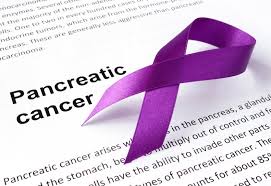Pancreatic cancer
Pancreatic cancer begins in the tissues of your pancreas — an organ in your abdomen that lies horizontally behind the lower part of your stomach. Your pancreas secretes enzymes that aid digestion and hormones that help regulate the metabolism of sugars.
Pancreatic cancer often has a poor prognosis, even when diagnosed early. Pancreatic cancer typically spreads rapidly and is seldom detected in its early stages, which is a major reason why it’s a leading cause of cancer death.
Causes
It’s not clear what causes pancreatic cancer in most cases. Doctors have identified risk factors, such as smoking, that increase your risk of developing pancreatic cancer.
How pancreatic cancer forms
Pancreatic cancer occurs when cells in your pancreas develop mutations in their DNA. These mutations cause cells to grow uncontrollably and to continue living after normal cells would die. These accumulating cells can form a tumor.
Most pancreatic cancer begins in the cells that line the ducts of the pancreas. This type of cancer is called pancreatic adenocarcinoma or pancreatic exocrine cancer. It accounts for the vast majority of pancreatic cancers.
Rarely, cancer can form in the hormone-producing cells or the neuroendocrine cells of the pancreas. These types of cancer are called islet cell cancer, pancreatic endocrine cancer or pancreatic neuroendocrine tumors.
Risk factors
Factors that may increase your risk of pancreatic cancer include:
- Excess body weight
- Chronic inflammation of the pancreas (pancreatitis)
- Diabetes
- Family history of genetic syndromes that can increase cancer risk, including a BRCA2 gene mutation, Lynch syndrome and familial atypical mole-malignant melanoma (FAMMM) syndrome
- Personal or family history of pancreatic cancer
- Smoking
Symptoms
Signs and symptoms of pancreatic cancer often don’t occur until the disease is advanced. When signs and symptoms do appear, they may include:
- Upper abdominal pain that may radiate to your back
- Yellowing of your skin and the whites of your eyes (jaundice)
- Loss of appetite
- Weight loss
- Depression
- Blood clots
Complications
As pancreatic cancer progresses, it can cause complications such as:
- Weight loss.A number of factors may cause weight loss in people with pancreatic cancer.
The cancer itself may cause weight loss. Nausea and vomiting caused by cancer treatments or a tumor pressing on your stomach may make it difficult to eat. Or your body may have difficulty properly processing nutrients from food because your pancreas isn’t making enough digestive juices.
Pancreatic enzyme supplements may be recommended to aid in digestion. Try to maintain your weight by adding extra calories where you can and making mealtime as pleasant and relaxed as possible.
- Pancreatic cancer that blocks the liver’s bile duct can cause jaundice. Signs include yellow skin and eyes, dark-colored urine, and pale-colored stools. Jaundice usually occurs without abdominal pain.
Your doctor may recommend that a plastic or metal tube (stent) be placed inside the bile duct to hold it open. In some cases a bypass may be needed to create a new way for bile to flow from the liver to the intestines.
- A growing tumor may press on nerves in your abdomen, causing pain that can become severe. Pain medications can help you feel more comfortable. Radiation therapy may help stop tumor growth temporarily to give you some relief.
In severe cases, your doctor may recommend a procedure to inject alcohol into the nerves that control pain in your abdomen (celiac plexus block). This procedure stops the nerves from sending pain signals to your brain.
- Bowel obstruction.Pancreatic cancer that grows into or presses on the small intestine (duodenum) can block the flow of digested food from your stomach into your intestines.
Homoeopathic Treatment
The scope of Homeopathy for cancer management varies depending on the type of cancer, stage of cancer and the general health of the patient. Following are some of the aspects of Cancer management with Homeopathy:
- One of the most distressing complaints associated with some varieties of Cancer is the agonizing pain. Conventional medicines can provide pain relief but only to a certain extent and these medicines are not without any side effects. Moreover there is always a restriction to the dosage that can be safely administered to the patient. The advantage of administering Homeopathic medicines in such cases is that there can be effective pain control without inducing any side effects.
- Homeopathy can help in improving the general well being and vitality of the patient.
- Conventional treatment options for cancer (chemotherapy, radiotherapy, etc) are associated with distressing side effects and homeopathy can play a definitive role to counter these side effects.
- The diagnosis of cancer often leaves the patient with a sense of depression, anxiety and fear. The treatment may induce additional irritability, impatience and mood fluctuations. Homeopathy can influence the psyche of the patient and help him to deal with these emotions in a better way.
- Homeopathic medicines may also have a role to play in controlling the pace at which the disease increases and spread of the disease to other organs.
Homeopathic medicines can also be administered along with the allopathic medicines.

